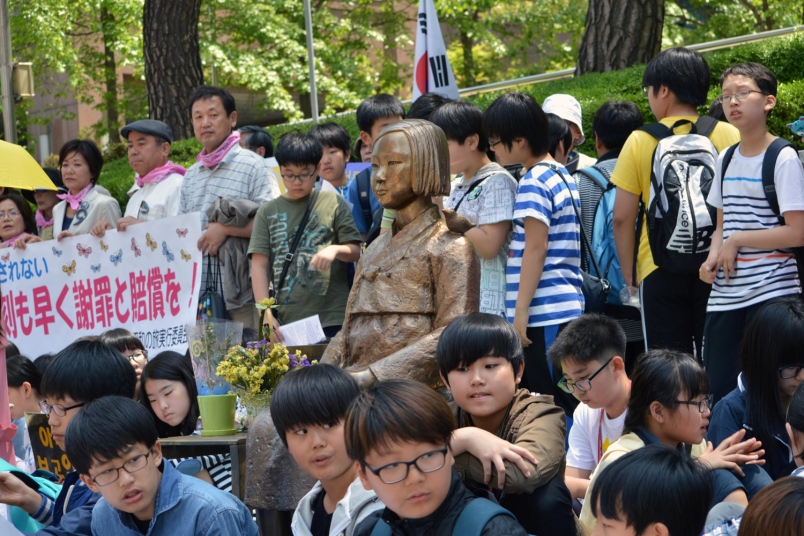- California Assembly OKs highest minimum wage in nation
- S. Korea unveils first graphic cigarette warnings
- US joins with South Korea, Japan in bid to deter North Korea
- LPGA golfer Chun In-gee finally back in action
- S. Korea won’t be top seed in final World Cup qualification round
- US men’s soccer misses 2nd straight Olympics
- US back on track in qualifying with 4-0 win over Guatemala
- High-intensity workout injuries spawn cottage industry
- CDC expands range of Zika mosquitoes into parts of Northeast
- Who knew? ‘The Walking Dead’ is helping families connect
Japan steps up demand for removal of comfort woman statue

Japanese protesters stand around a comfort women memorial near the Japanese Embassy in Seoul. (Yonhap)
By Yi Whan-woo
A statue of a Korean girl located across the street from the Japanese Embassy in Seoul is emerging as a new bone of contention because Tokyo is demanding its removal, as it symbolizes Japan’s wartime sexual slavery.
Korean officials say Japan’s Prime Minister Shinzo Abe and his Cabinet are demanding that the Korean government remove the statue that was set up by civic activists.
“Whether to remove the statue or not is not up to the Korean government. That cannot be settled in governmental talks,” a South Korean official said on condition of anonymity.
The statue commemorates tens of thousands of Korean women who were forced into prostitution at frontline brothels operated by the Japanese Army before and during World War II.
During the 10th round of working-level talks in Seoul, Wednesday, Japanese officials formally asked the government to remove the statue in order to settle the decades-long issue of sexual slavery, according to diplomatic sources.
Tokyo’s Asahi Shimbun also reported Tuesday that Abe called for the removal of the statue during his summit with President Park Geun-hye at Cheong Wa Dae on Nov. 2.
The two East Asian neighbors have wrangled over decades to resolve issues related to Japan’s state-perpetrated sex crimes, which have been one of the biggest stumbling blocks in improving ties.
The statue was set up by the Korean Council for Women Drafted for Military Sexual Slavery by Japan (commonly known as the Korean Council), a private Seoul-based group advocating for surviving victims.
“The statue must be embarrassing for the Abe government as it has raised public awareness both in Korea and abroad of Japan’s violation of women’s human rights,” said Lee Myeon-woo, a senior researcher at the Sejong Institute.
“But there’s no room for the Park administration to accept Japan’s unilateral demand because removing the statue would trigger controversy over a possible violation of freedom of expression.
“I’d say the Abe government’s claim is comparable to demands made by North Korea’s Kim Jong-un regime to stop anti-Pyongyang leaflet campaigns carried out by civic activists,” Lee added.
Erected in December 2011, the controversial statue is of a barefoot teenage girl with roughly cut hair sitting in a chair, with the shadow of an elderly woman etched into the ground beneath her.
Since then, a total of 21 similar statues have been set up in Korea alone, according to an official at the Korean Council.
Korean American communities have also been carrying out campaigns to set up statues in their respective neighborhoods.
“All those statues, except for the one outside the Japanese embassy and the one at the War and Women’s Human Rights Museum in Seoul, were erected by civic activists other than us,” the official said on condition of anonymity. “Those activists made the decisions alone. I don’t think the government can find out if there are other civic groups that plan to build additional statues in the future.”
An activist who heads a shelter in Gwangju, Gyeonggi Province for a dwindling number of aging former Korean sex slaves claimed the Abe government must change its unrepentant attitude to resolve the historical conflict.
“A series of statues have been built because Japan has been trying to cover up the truth of its brutal sex crimes while the surviving victims have been passing away,” said Ahn Shin-kwon, the chairman of the House of Sharing.
Koreans accounted for a majority of the estimated 200,000 sex slaves, who were euphemistically called “comfort women.”
Less than 50 of the former sex slaves, who are in their 80s or older, remain alive in Korea, while Japan has refused to offer an apology or compensation to them.
“To my understanding, Japan is only concerned about its national image being tarnished globally, especially in the United States, its most important ally,” Ahn said.
“Its efforts have failed and will never succeed because the world knows in its heart it committed extreme wrongs during WWII.”
Ahn said Armenian Americans in the U.S. protested against Japan’s move to hamper Korean Americans from setting up a statue in a park in Glendale, Calif. in 2013.
This was the first statue overseas to commemorate the comfort women.
“Armenians share common ground with Koreans in terms of historical wounds because they were massacred under Turkish rule during World War I,” he said. “They must have understood that the statue can help publicize Japan’s brutality and its need for apology.”












![일본 사도광산 [서경덕 교수 제공. 재판매 및 DB 금지]](http://www.koreatimesus.com/wp-content/uploads/2024/07/PYH2024072610800050400_P4-copy-120x134.jpg)



Pingback: Hair Removal Insurance Coverage | salon - salon services
Pingback: Hair Removal In Arab Countries | permanent hair removal
Pingback: Female Hair Removal Private | certificate - makeup organizer
Pingback: Asian Hair Removal | beauty supply
kelly
November 23, 2017 at 5:11 PM
Very nice and always successful.
This is a very good article.
I’m waiting for you the other article.
togel online